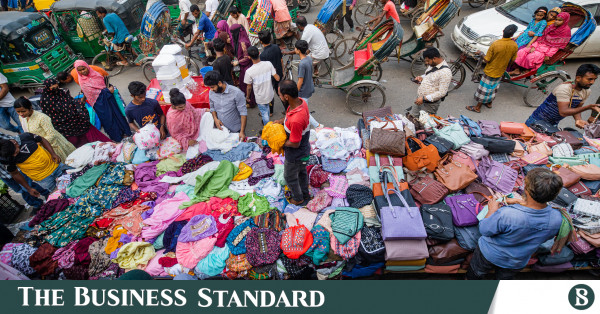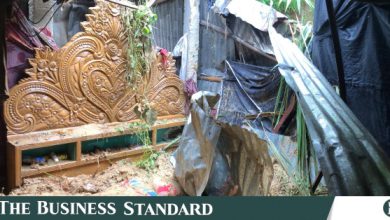Is street-footpath extortion declining or just shifting to new groups?


There is a significant discrepancy between the wholesale price of vegetables at the farmer level and the retail price in Dhaka. Sometimes, the retail price can be more than ten times higher. This stark difference is primarily due to extortion at various levels of the transport and wholesale markets.
Leaders and activists of the Awami League, its affiliated organisations, and some law enforcement members used to collect illegal extortion fees from around 300,000 footpath shops in the capital.
The fall of the Awami League government led to the collapse of these extortion syndicates. While some new gangs are attempting to re-establish extortion operations, businessmen and transport workers have found relief due to increased monitoring by students and the army.
Karwan Bazar, Dhaka’s largest wholesale vegetable market, handles about 58% of the city’s vegetable trade, according to the Food and Agriculture Organization (FAO). Vendors face multiple layers of payments to sell vegetables here, impacting the final price.
Ruhul Amin, who regularly transports vegetables from Savar to Karwan Bazar, used to pay extortion fees at Gabtoli, Beribadh, and other locations, along with at least 1,000 taka per month to traffic police. In Karwan Bazar, fees ranged from 70 to 150 taka, sometimes even more than the size of the vehicle. Amin said tolls are no longer required, and extortion fees were last collected on 14 August. Drivers who failed to pay faced violence and vandalism. The absence of these fees has significantly benefited vendors and drivers.
Recent discussions with 15 lorry drivers and wholesale traders revealed that Jubo League leader Lokman previously controlled extortion in Karwan Bazar. Following the fall of the Awami League government on 5 August, extortion ceased, although new gangs have attempted to revive it. Due to student and military oversight, these attempts have largely been thwarted.
Wholesale trader Bashir Hossain reported paying 300-500 taka daily for his vegetable stall, but this practice has stopped. Truck driver Iqbal Hossain, who used to pay 1,000 taka for transporting potatoes, said that extortion fees are no longer being charged. Similarly, in Shahjadpur, Gulshan, Mohakhali, Gulistan, and Moghbazar, shops and auto-rickshaws previously burdened with extortion fees are now free from these charges.
Footpath vendors and hawkers, numbering between 250,000 and 300,000, used to pay 150-200 taka in extortion fees. With the current crackdown, these fees have ceased, but there is concern about a potential resurgence. Murshidul Islam, president of the Bangladesh Hawker Oikya Parishad, suggests a five-year plan to ensure the permanent rehabilitation of hawkers and prevent the return of extortionists.
SM Najer Hossain, vice president of the Consumers Association of Bangladesh, has called for strong measures to suppress any new extortion groups. He believes that persistent enforcement could significantly reduce prices and urged continued action to address this issue.




